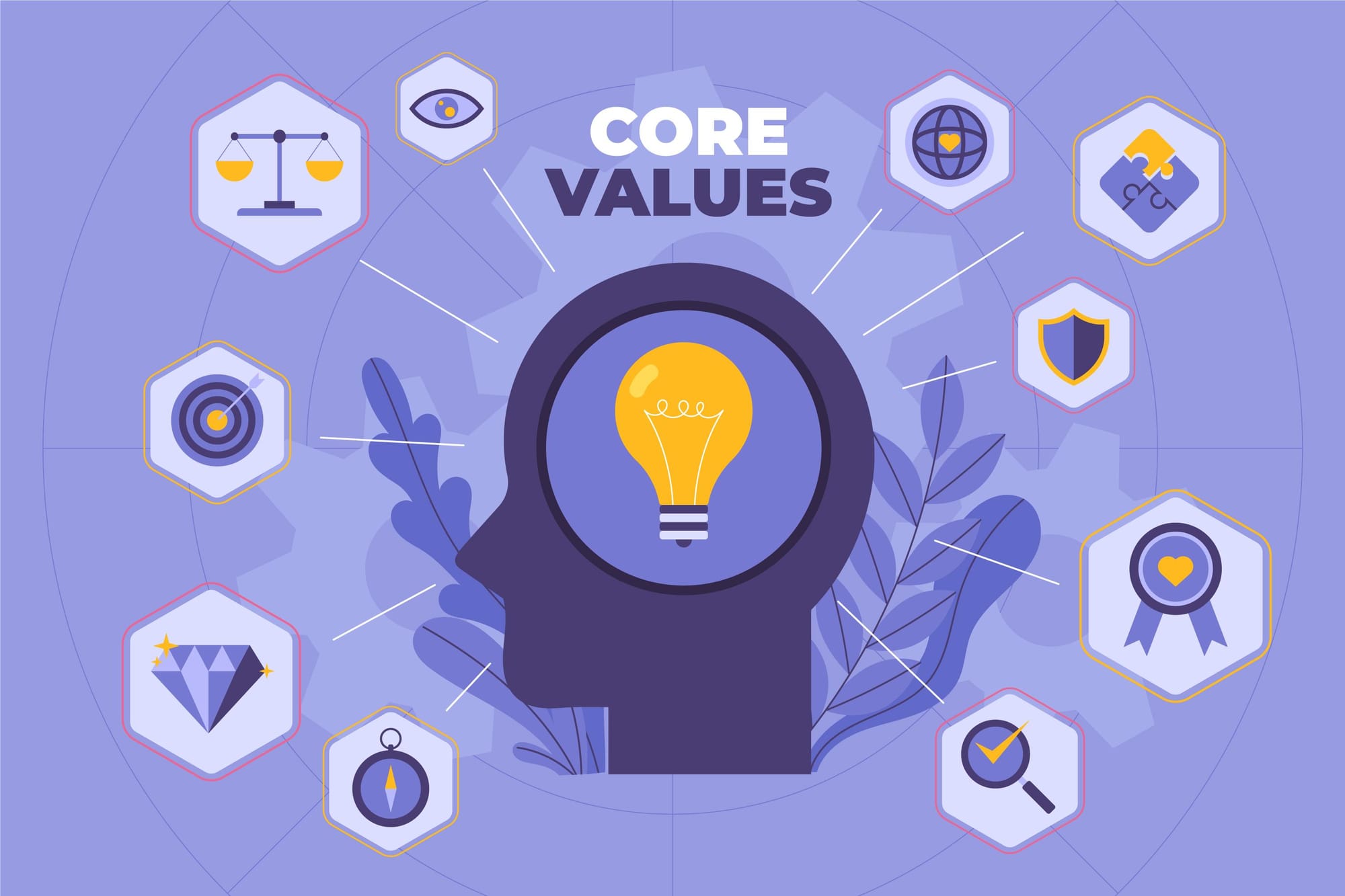Core Values

Core values are the fundamental beliefs of an organization, guiding its behavior and decision-making. They play a vital role in shaping the organizational culture and driving the organization toward its goals. Before delving into core values, it's essential to first explore and understand the organizational beliefs that form the foundation of an organization's identity and principles.
Organisational Belief
The concept of Organisational Belief delves into the deep-rooted sense of certainty, permanence, assurance, and rigidity that shapes an individual's perspective. Belief encompasses both internal and external components. Internally, it represents an individual's personal interpretation, while externally, it is influenced by reference points, the experiences of others, and the opinions of their social circles. When core values serve as the reference point, experience, or association for an individual, they gradually become ingrained as beliefs.
It's important to note that altering an individual's internal interpretation is no easy feat. To cultivate belief in others, it's crucial to provide them with reference points that resonate with their core values. By influencing someone's perspective through these reference points, experiences, or associations, we can foster a profound and impactful belief. This belief, in turn, manifests in the individual's actions and performance.
For example:
It's important to keep in mind that our beliefs are often shaped by our reference points and interpretations. For instance, if we believe that Monday comes after Sunday and Tuesday comes after Monday, it's because all of our reference points support this belief. However, if our reference points and interpretations are incorrect, it can lead to forming wrong beliefs. On the other hand, when our reference points and interpretations align with our goal statement, it can strengthen employees' belief in that goal and motivate them to work towards it.
Just like a table needs strong pillars to stand, building new beliefs within an organization requires strong pillars as well. An optimistic individual can truly change the game with the right belief pattern. Conversely, a negative belief pattern can hinder progress and overshadow one's potential for success.
Examples of negative beliefs:
It's important to be mindful of negative beliefs that can impact our thinking and actions. These beliefs can ultimately lead to a sense of permanence, which can be very powerful. For example, people in government jobs may have a strong sense of permanence, which can affect their behavior and decision-making, such as adhering strictly to designated lunch hours even in critical situations.
It's also interesting to note the different beliefs held in various regions, such as the preference for government jobs in Uttar Pradesh and Bihar, contrasted with the emphasis on business in Rajasthan and Gujarat. Beliefs indeed hold a significant influence over individuals and communities.
To counter negative beliefs, it's essential to seek out accurate interpretations and reference points to build constructive beliefs. Detachment from sources that propagate negative beliefs is crucial in this practice. This involves distancing oneself from individuals and influences that perpetuate harmful interpretations and perspectives.
Framework of Execution
When establishing the framework for execution, it's crucial to define the core values of your organization. These values can include dependability, reliability, loyalty, commitment, openness, customer involvement, consistency, efficiency, compassion, collaboration, focus on impact, outperformance, being a fast mover, fostering innovation, embracing an entrepreneurial spirit, maintaining a positive outlook, and prioritizing simplicity and service to others.
Many organizations create phrases or sentences by amalgamating these core values. Let's take a look at some examples of the core values adopted by prominent brands.
So what are the core values of your organization?
1. Dependability
2. Reliability
3. Loyalty
4. Commitment
5. Being Open
6. Involving customers
7. Consistency
8. Efficiency
9. Compassion
10. Collaboration
11. Focus on Impact
12. Outperforming
13. Being a fast Mover
14. Innovation
15. Embracing an Entrepreneurial Spirit
16. Positivity
17. Keeping it Simple
18. Service to Others
Some organizations craft sentences or phrases by combining these core values. Let's explore some examples of the core values of some well-known brands.
It's important to establish and reinforce your core values within your organization. This involves identifying and articulating your core values, and then consistently communicating and reinforcing them to your employees. Your core values might encompass a commitment to customer centricity, emphasizing that the customer comes first; internal collaboration, stressing the importance of teamwork among your employees; and ownership, which entails taking responsibility for tasks and projects as if they were their own. These core values are instrumental in shaping and reinforcing the beliefs and behaviors of your team members, ultimately contributing to a strong and cohesive organizational culture.
Write your compelling exciting story.
Our organization has a compelling and exciting story that revolves around our core belief in removing obstacles and promoting high performance. Our story emphasizes the principles of dedication, innovation, and collaboration. By sharing this story with every department, we hope to emotionally bind our employees and create a strong sense of purpose within the organization.
For instance, one of our core beliefs is to prioritize the well-being and growth of our team members. We believe that by fostering a supportive and empowering work environment, we can elevate the performance of every individual and effectively remove any barriers that hinder progress. Our commitment to inclusivity and diversity further reinforces our mission to create a thriving and dynamic workplace.
Just like Baba Ramdev's emphasis on Swadeshi, which promotes indigenous products, we also have a strong focus on nurturing local talent and promoting a sense of pride in our organization. We are dedicated to fostering an environment where every employee feels valued and empowered to contribute to the organization's success.
Additionally, similar to campaigns led by leaders such as Prime Minister Narendra Modi, we actively promote initiatives that align with our core values. For example, we champion initiatives focused on sustainability, community engagement, and personal development. These initiatives underscore our commitment to creating a positive impact and uplifting our employees and the communities we serve.
Write the name of your Gems who will help you in spreading your story.
Identifying and training key supporters within your organization is essential for spreading your story effectively. It's crucial to select individuals who embody your core values and can serve as positive agents for your brand. By empowering these individuals as your "Gems," you can ensure that they reflect and propagate your organization's culture throughout the entire team. This concerted effort will shape a positive customer experience and foster a strong and positive reputation for your brand.
Write your milestones and actionable along with dates and days.
To ensure the successful implementation of our goals, we need to outline our milestones, action items, and deadlines. This will involve specifying the dates and days by which we plan to achieve each milestone and the actionable steps we will take to reach them. Additionally, we should also schedule meetings to inform and engage our employees about these milestones and action items. These meetings could be conducted in person or virtually, and we should decide on the frequency and timing that would best suit our teams.
In addition to meetings, we will need to communicate the milestones and actionable items through various channels, such as email, social media, internal webinars, or physical meetings. It's important to ensure that all employees are informed and on track to achieve these goals.
To support our employees in reaching these milestones, we should engage our leaders to provide internal or external training, counseling, teaching, mentoring, or coaching as necessary. This will empower our teams to perform the action steps required and ultimately reach the set milestones.
Ultimately, by aligning our actions with our core values and organizational beliefs, we will build a strong foundation for our organization and propel it to the next level of success.

